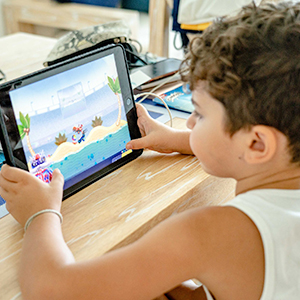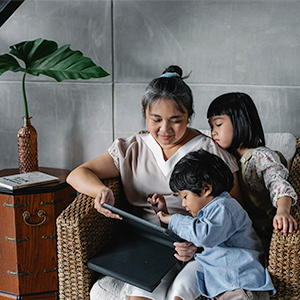My child and screens by Laurène Lahierre
The digital landscape is changing rapidly and with more and more technological advances, it is almost impossible to prevent children from being exposed to screens. Research findings on screen use are mixed, highlighting both benefits and risks. There is, however, a consensus on screen use guidelines to limit their developmental, psychosocial and physical impact. It is based on:
Age of exposure
Screen time management: involve your child in this self-regulation process
Parental supervision is essential to mitigate negative effects
Modelling around positive habits: discipline yourself!
1. Age of exposure
– Even though babies do not absorb the content of television programmes per se, they can still retain their attention. From 18 months onwards, the toddler can remember brief sequences.
In contrast, sustained exposure in children under the age of 2 is correlated with significant language delays.
– Shortly before the age of 3, children begin to understand the content of what they watch. But at this age, television is unlikely to support their learning. They learn much more from direct interaction with the people around them.
– Before the age of 3, it is therefore important to encourage ‘doing together’ rather than watching cartoons, even if those are considered suitable. This will allow your child to engage more with language, motor skills and social skills.
2. Screen time management: involve your child in this self-regulation process
– Define a timetable together with your child in order to make him/her more responsible. This can take the form of a table with days and time specifying screen use. This will limit conflicts linked to misunderstandings or attempts at negotiation.
You can also formalise screen-free times (sport, meals, games, reading, etc.). Your child will thus understand that screens are an “extra” activity and not an immediate solution to his/ her boredom.
– In order to preserve good sleeping habits, screen time should not have an impact on wake up or bedtime. Your child should not use screens less than one hour before bedtime.
– If devices are shared between siblings, it is important to define time slots for each family member.
3. Parental supervision is essential to mitigate negative effects
– Define screen-free areas around the house (bedroom, kitchen, bathroom, toilet) and common areas where digital devices are allowed.
– Choose age-appropriate educational content for your child.
– Be interested and present when your child uses devices. This will give you the opportunity to better understand what he/ she is interested in.
– This time would also become a source of interaction. Comment, explain and clarify what your child is watching. Ask them about their understanding of the story, the emotions of the characters, the anticipation of the plot…
By reinforcing their language and cognitive skills, you turn screen time into a positive learning experience.
4. Modelling around positive habits: discipline yourself!
– Avoid keeping the TV on when no one is watching it or when you are engaged in another activity.
– Be aware of your own relationship to screens and make sure you don’t use them during meals, playtime or family time.
– Avoid checking your phone too often when your child is present. If they feel you are captivated by your mobile phone, they will naturally tend to be interested in it.
– Explain to your child the distinction between “work screen time” and “recreational screen time”.
You now understand that there is no need for extreme measures when it comes to screens, such as banning them from your child’s life.
The point is to set a framework so that digital devices do not become omnipresent and thus leave your children the possibility of expressing themselves through what they like. Screens can become a medium for interaction and dialogue.
In any case, whether your child is young or older, whether we’re talking about digital devices or video games, always ask yourself the question of his or her motivation for using them. Is it because they are a source of pleasure or is it because your child is avoiding facing concerns or boredom? The second scenario calls for vigilance because there is a greater risk of having an excessive, even abusive relationship with screens when boredom is involved.





